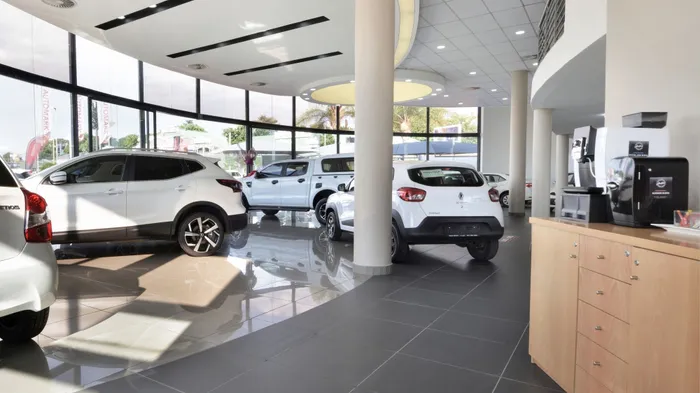Motus Holdings share price falls after lower dividend as it battles weaker vehicles sales markets

Vehicle car dealership showroom. Motus Holdings reported a resilient financial performance in the year to June 30, 2024, despite a lower annual dividend. File picture: Supplied
Motus Holdings’ share price fell 4.2% yesterday on the JSE after it reported a 26.7% lower dividend of 520 cents a share for the year to June 30, notwithstanding a resilient financial performance in tough vehicle market conditions.
Revenue was up 7% to R113.76 billion. Operating profit fell 4% to R5.5bn. Headline earnings per share was down 28% to 1 479 cents per share. Cash flows from operating activities increased sharply to R3.53bn compared with last year’s outflow of R1.19bn.
The share price traded at R118.97 yesterday afternoon, 4.2% below the opening price, but nevertheless 13.8% higher than the R104.52 that it traded at a year ago.
Motus’s directors said yesterday that their business had been supported by strategies of international expansion and diversification, beyond vehicle sales in South Africa, the growth of which was limited because of financially constrained consumers.
Organic business initiatives and bolt-on acquisitions also assisted the group’s performance.
The automotive industry was impacted by higher-than-normal vehicle and parts price inflation, volatility in the rand against major currencies, high interest rates, and high cost of living in all the geographies that Motus operates in.
The oversupply of vehicles from OEMs had moderated. However, additional discounts to encourage vehicle sales were negatively impacting margins. Increased competition had entered the market through new derivatives, new entrants, and competitive pricing.
“The group has responded well, supported by cost containment, resilient customer demand, supply chain normalisation and continued funding by the banks. The group continues to innovate, improve efficiency, and provide superior customer experience,” the group directors said.
The importer business was also impacted by currency volatility and increased landed costs on vehicles, including freight costs.
Delays at the SA ports and a shortage of vessels and equipment had increased lead times for imported products, impacting availability. The business, however, was positively impacted by canopy sales.
The Mobility Solutions business ended the year with a strong result due to an increase in banking alliance profits, an improvement in credit loss ratios, fair value adjustments on preference share arrangements and investment income returns due to higher interest rates. The launch of new product offerings also contributed to the business’s success.
In the UK, the business was supported by the inclusion of recently acquired bolt-on commercial dealerships. The UK passenger division had a better second half after being positively impacted by improved supply and increased fleet deals.
The Aftermarket Parts businesses in the UK performed strongly in a buoyant market where margins remained strong. Both the retail and wholesale businesses ended the year with a strong result.
In Australia, the market was buoyant despite high inflation and interest rates. The results benefited from the additional volumes, margin retention on back-order commitments, the normalisation of vehicle availability and the bolt-on acquisition acquired during the financial year.
During the year, the group focused on reducing inventory and vehicles for hire to acceptable levels to reduce net debt and net finance costs.
The group inventory was reduced by R4.9bn from the prior financial year. Vehicles for hire reduced by R1.3bn from its highest levels in December 2023, the peak in travel months.
BUSINESS REPORT
Related Topics: